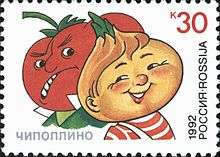Cipollino

Cipollino, or Little Onion, is a fictional character from Gianni Rodari's eponymous Tale of Cipollino (Italian: Il romanzo di Cipollino), also known under its 1957 renamed title Adventures of Cipollino (Italian: Le avventure di Cipollino), a children's tale about political oppression. He also appeared before the publication of the book in the children's magazine Il Pioniere, which Rodari was editor.[1] Cipollino was popular in the Soviet Union, up to the point of being adapted as a ballet composed by Karen Khachaturian and choreographed by Genrik Alexandrovich Maiorov,[2] originally staged in Taras Shevchenko National Opera and Ballet Theatre of Ukraine in 1974.
In a world inhabited by anthropomorphic produce, Cipollino fights the unjust treatment of his fellow vegetable townsfolk by the fruit royalty (Prince Lemon and the overly proud Lord Tomato) in the garden kingdom. The main theme is the struggle of the underclass against the powerful, good versus evil, and the importance of friendship in the face of difficulties.[3]
Adaptions
- Chipollinos tavgadasavali (Adventure of Cippolino), a Georgian TV film[4]
- Cipollino, a 1961 animated feature by Soviet animation studio Soyuzmultfilm[5]
- Cipollino, Soviet film directed by Tamara Lisitsian
See also
References
- ↑ Anne E. Duggan Ph.D.; Donald Haase Ph.D.; Helen J. Callow (12 February 2016). Folktales and Fairy Tales: Traditions and Texts from around the World, 2nd Edition [4 volumes]: Traditions and Texts from around the World. ABC-CLIO. p. 861. ISBN 978-1-61069-254-0.
- ↑ Official Website of Bolshoi Theatre in Moscow, Russia
- ↑ Ballet Theatre of Lancaster
- ↑ Chipollinos tavgadasavali on IMDb. Retrieved 17 July 2010.
- ↑ Jack Zipes (27 January 2011). The Enchanted Screen: The Unknown History of Fairy-Tale Films. Routledge. pp. 325–327. ISBN 978-1-135-85395-2.